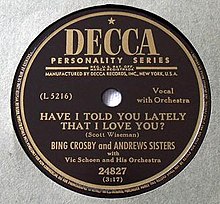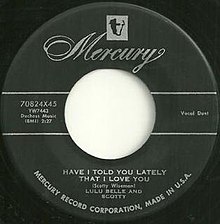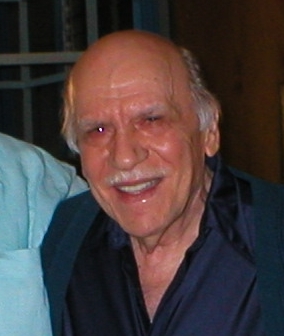
John S. Marascalco was an American songwriter most noted for the songs he wrote for Little Richard. He was born in Grenada, Mississippi and died in Los Angeles, California.

"True Love" is a popular song written by American songwriter Cole Porter, published in 1956. The song was introduced by Bing Crosby and Grace Kelly in the musical film High Society. "True Love" was nominated for the Academy Award for Best Original Song. Kelly's contribution on the record is relatively minor, duetting with Crosby on only the final chorus. Nonetheless, the single is co-credited to her.
"Dark Moon" is a song written by Ned Miller, which was popularized in several different musical formats after its composition. The more popular versions of the song were recorded by Bonnie Guitar and Gale Storm.

"You Don't Know Me" is a song written by Eddy Arnold and Cindy Walker in 1955. "You Don't Know Me" was first recorded by Arnold that year and released as a single on April 21, 1956, on RCA Victor. The best-selling version of the song is by Ray Charles, who took it to number 2 on the Billboard Hot 100 chart in 1962, after releasing the song on his number 1 album Modern Sounds in Country and Western Music. The first version of the song to make the Billboard charts was by Jerry Vale in 1956, peaking at number 14 on the pop chart. Arnold's version charted two months later, released as an RCA Victor single, 47–6502, backed with "The Rockin' Mockin' Bird", which reached number 10 on the Billboard country chart. Cash Box magazine, which combined all best-selling versions at one position, included a version by Carmen McRae that never appeared in the Billboard Top 100 Sides listing.
"Heartaches by the Number" is a popular country song written by Harlan Howard, and published in 1959. The sheet music was a best seller in both the US and Britain in January 1960.

Myrtle Eleanor Cooper and Scott Greene Wiseman, known professionally as Lulu Belle and Scotty, were one of the major country music acts of the 1930s and 1940s, dubbed The Sweethearts of Country Music.

Elvis: A Legendary Performer Volume 1 is a compilation album by American singer and musician Elvis Presley issued in 1974 by RCA Records. It features 14 tracks, which includes twelve songs and two interviews with Presley. It was certified Gold on January 8, 1975, Platinum and 2× Platinum on July 15, 1999, and 3× Platinum, by the Recording Industry Association of America (RIAA) on March 8, 2018.

"I Forgot to Remember to Forget" is a 1955 rockabilly and country song, first recorded by Elvis Presley and written by Stan Kesler and Charlie Feathers. It was Elvis' first no. 1 record nationally. The single was the fifth and final single released on Sun Records before Elvis moved to RCA Records.
"Hawaiian Wedding Song" originally entitled; "Ke Kali Nei Au" was adapted from a 1926 love song written by Charles E. King and originally recorded by Helen Desha Beamer in its original version but re-written by Al Hoffman and Dick Manning and renamed as "Hawaiian Wedding Song". The song was recorded by Bing Crosby, Andy Williams and Elvis Presley.
"Witchcraft" is a popular song from 1957 composed by Cy Coleman with lyrics by Carolyn Leigh.
"Blue Hawaii" is a popular song written by Leo Robin and Ralph Rainger for the 1937 Paramount Pictures film Waikiki Wedding, starring Bing Crosby and Shirley Ross. Crosby recorded a version with backing by Lani McIntyre and His Hawaiians, which was released in 1937 as the B-side of "Sweet Leilani." This reached the No. 5 spot in the charts of the day during a 13-week-stay
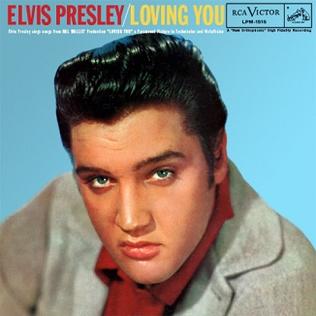
Loving You is the first soundtrack album by American rock and roll singer Elvis Presley. It was released by RCA Victor in mono, LPM 1515, in June 1957 to accompany his first starring film, Loving You (1957). Recording sessions took place on January 15, 16, 17, and 18, 1957, at the Paramount Pictures Scoring Stage, and on January 12, 13, 19, and February 23 and 24, 1957, at Radio Recorders in Hollywood. These are the first sessions where Steve Sholes is officially listed as producer. It spent ten weeks at No. 1 on the Billboard Top Pop Albums chart. It was certified Gold on April 9, 1968 by the Recording Industry Association of America.
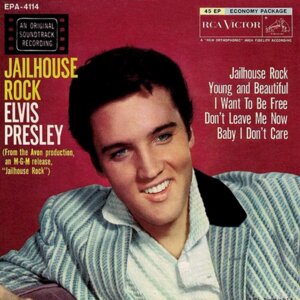
Jailhouse Rock is an EP by American singer Elvis Presley, featuring songs from the movie of the same name. It was released by RCA Victor, with catalogue EPA 4114, on October 30, 1957. Recording sessions took place at Radio Recorders in Hollywood on April 30 and May 3, 1957, with an additional session at the Metro-Goldwyn-Mayer Soundstage in Hollywood on May 9 for "Don't Leave Me Now". It peaked at #1 on the newly inaugurated Billboard EP chart where it remained at #1 for 28 weeks. The EP album was the best selling EP album of 1958 according to Billboard.

Blue Hawaii is the fourth soundtrack album by the American singer Elvis Presley, released on RCA Victor Records in mono and stereo, LPM/LSP 2426, on October 20, 1961. It is the soundtrack to the 1961 film of the same name starring Presley. In the United States, the album spent 20 weeks at the number one slot and 39 weeks in the Top 10 on Billboard's Top Pop LPs chart. It was certified Gold on December 21, 1961, Platinum and 2× Platinum on March 27, 1992, and 3× Platinum on July 30, 2002, by the Recording Industry Association of America. On the US Top Pop Albums chart, Blue Hawaii is second only to the soundtrack of West Side Story as the most successful soundtrack album of the 1960s.
"Tryin' to Get to You" is a song written by R&B singer songwriters Rose Marie McCoy and Charles Singleton. It was originally recorded by the Washington DC vocal group The Eagles in 1954 and released in mid-1954 on Mercury Records 70391. The format of the title on The Eagles’ record was “Tryin’ to Get to You”, with an apostrophe.

"Paralyzed" is a 1956 song recorded by Elvis Presley for his album Elvis. The song was recorded on September 1, 1956, and has been well received by music critics. The song was written by Otis Blackwell, with Elvis receiving partial song-writing credit.

Ricky is the debut album by American actor and rock and roll musician Ricky Nelson, released in November 1957. The album topped the Billboard's Top LPs chart, becoming the first solo artist to chart under the age of 18.

Peace in the Valley is an EP by American singer and musician Elvis Presley, released in April 1957 on RCA Victor Records in mono with catalogue number EPA 4054. It reached number three on the short-lived Billboard EP chart, number three on the album chart and number 39 on the singles chart.
"Beyond The Reef" is a song written by Canadian Jack Pitman in Hawaii in 1948. It was first performed by Hawaiian artist Napua Stevens in 1949.
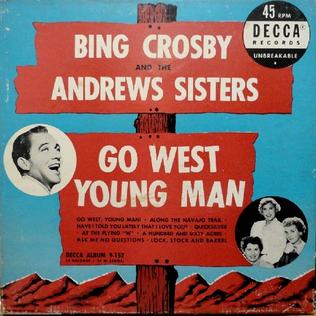
Go West Young Man is a compilation album of songs on one 10" vinyl record by Bing Crosby and The Andrews Sisters released in 1950 featuring songs that were sung by Crosby and the Sisters with a Western-type genre. This album is one of the first by Crosby to not be released on 78 rpm records before going straight to an LP or set of 45s. The album includes several songs which had already enjoyed Billboard chart success. “Along the Navajo Trail” reached the No. 2 position in 1945 and "One Hundred and Sixty Acres", "Have I Told You Lately That I Love You?" and "Quicksilver" also charted.
